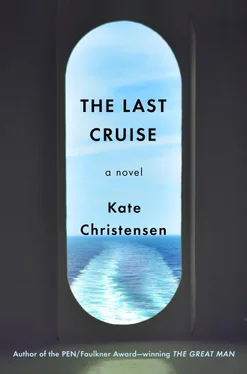The other sous-chef glanced up briefly as Mick came in. His black hair was neatly clipped. He was soft-bodied and round like a baby, and had a huge head with a sweet round face, but his eyes looked weary and old.
“Mick,” Mick reminded them both. He sat in the empty chair farthest from the desk.
“Kenji,” said the Japanese dude. He had a seemingly natural puckish expression he managed to parlay into a glower.
The Frenchman’s thick lips twisted. “Jean-Luc,” he said with apparent bitter condescension.
Mick almost laughed, but checked himself.
“Chef,” the three of them said in ragged unison as Laurens came in and sat abruptly in the chair they’d left him, the one behind the desk. His pale, freckled face held no expression. He bared his teeth at them all, but it wasn’t a smile, and his eyes flickered from one face to another. “First, I’d like to hear from each of you how you think it went last night. Kenji, you first. Talk to me about the fish.”
“ Oui, Chef,” said Kenji. “I think most thing come out good. I think we have good rhythm, my team perform well. When we get hit with a lot of order for two hour, we stay cool, don’t lose our shit. Rodrigo did good, cooked perfectly. Stefan had some trouble with his timing a couple time at the beginning. All in all we did okay, very good. I was proud of them.”
“What could you have done better?” Laurens fired back. “What did you fuck up? What went wrong?”
Mick waited for Kenji to get defensive, bluster, try to cover his ass. Instead he said, “Nothing wrong, Chef. Stefan had trouble with tricky timing of fillet of sole at first but he learn quick. We did very well. No send-backs. Everyone happy, Chef.”
Laurens kept his gaze on Kenji for a moment. Kenji looked back, unperturbed. His eyes even ticked closed a millimeter. Mick was impressed: this guy had sangfroid. Either he wasn’t afraid of Laurens or he was an excellent actor.
“Mick,” said Laurens.
Mick snapped to. “ Oui, Chef.”
“Did you talk to the insubordinate girl who was late?”
“Consuelo. I did, Chef. I stayed on her ass all night. She’s in line now. No more trouble from her or I will answer for it.”
“I heard good reports from Sidney about the buffet. Passengers were pleased with your pig roast and the entertainment. All around, a success.”
Mick had been aware of Sidney all night last night and had worked hard, unobtrusively, to make sure his initial impression was good. The maître d’ and head of the waitstaff was an elegant, punctilious, demanding Welshman, and everyone who knew him and had worked with him before apparently deeply respected him. No one seemed to know anything about him, apart from the fact that he was something of a legend among Cabaret kitchen crews. He was like the Godfather. He could make you, he could break you, and no one ever questioned him. And he was effortlessly proper; he brought civilization with him like his own personal corrective. He was therefore superbly effective. And a positive assessment from Sidney, coming from Chef himself, was worth a gold brick or two in galley currency. Mick tried not to beam. He felt Jean-Luc sending him a sidelong death ray.
“I put Consuelo in charge of developing and executing the hors d’oeuvres,” Mick said. It always looked good to deflect praise onto your staff whenever possible, and Consuelo deserved this, especially after she had gotten herself in Laurens’s bad graces right off the bat. “She came up with the sliders and the kebabs. People seemed to love them. Sidney is correct.”
“Ah,” said Laurens. “Was there anything you could do better as we go on?”
“Tonight, the theme is elegant and fancy. Gourmet in 1950s style. Canapés to start. Caviar and blini. A beautiful spread of classic food using lighter, more contemporary recipes and techniques.”
“Ah,” said Laurens again, noncommittal, blank. “Thank you. Okay. Jean-Luc,” he added as if it were an afterthought.
“ Oui, Chef.”
“Your assessment of last night. Your station had some serious trouble.”
“The squab,” said Jean-Luc. “Didier, he know now what he did wrong.”
“Didier,” said Laurens, “was not in charge of cooking perfect squab. You were. What happened?”
“Squab,” said Jean-Luc with hatred. “Didier overcook it. C’est simple. Now he know not to do that.”
“Anything else?”
“I would like to do the flambé of the steak Diane on the floor individually. It is impressive and also, the steak is better.”
“Talk to the waitstaff, see what they think.”
Jean-Luc opened his mouth to launch into something about tableside pyrotechnics, Mick was certain, and he also knew that the waitstaff would comply with whatever the chefs wanted them to do, they always did.
“Lobster thermidor,” said Laurens.
Jean-Luc shut his mouth. Blinked. “Excuse me, Chef?”
“How do you make it? All three of you. I want to hear your preferred method and recipe.”
“Lobster thermidor,” said Kenji. “Yes, I know it. It was invented in France in a theater restaurant. Lobster steamed, de-shelled, packed into the clean shells and covered in a cream sauce with sherry and mustard, then grated Gruyère on top, then broiled.”
“Nothing else?” said Laurens.
“That is how I would make it, but I have not ever had to.”
“You never made it out of curiosity? It’s a classic.”
“No, Chef,” said Kenji coolly. “I would welcome the opportunity.”
“Beh,” said Jean-Luc, “it’s too much work for what you get, it’s too rich, and very expensive. In Paris we did a version much easier, much faster. We make the sauce ahead of time, no shells, plated the lobster meat, et fini, but it’s not a good return. You cannot taste the lobster under all the sauce. It’s a waste of money and ingredients and time, Chef.”
Laurens held Jean-Luc’s gaze for a couple of beats, during which Mick gathered himself, thinking.
“Mick, anything to add?”
“I made homard thermidor in Budapest at the restaurant where I learned to cook. It was a three-step process for the sauce, and it was excellent, delicious, and worth the trouble.” He paused and added pointedly, without looking at Jean-Luc, “Expensive, yes, but not more than filet mignon. We made the custard separately in a bain-marie, then folded it into the sauce, tempering it, very slowly. For the sauce we did not use cream; we made a roux as for a béchamel and then added to it a glaze of lobster stock, wine, and sherry with a sprig of tarragon, a pinch of nutmeg. Then you slowly temper together the béchamel and glaze with the cream custard, adding a little dry mustard, until it is very glossy, thick, then pour just the right amount, not too much, over the tender lobster meat. And broil with a little grated Gruyère to finish, then a hit of paprika, and finally, we served it over buttered egg noodles with a small pitcher of the sauce on the side.”
“I’m hungry,” said Laurens with a half-smile so faint, Mick was sure he’d imagined it. “Can you make me one for lunch?”
“ Oui, Chef,” said Mick.
“Also,” said Laurens. “One more thing. Mick, you’ll replace Jean-Luc on the meat station for this cruise. Jean-Luc, you’re running the buffet galley now. I think that is a better use of our resources.”
“ Oui, Chef,” Mick said. “I’d like to bring Consuelo over too.”
Laurens flashed a look at him. Mick knew he’d stuck his neck out too far now with Chef, but he held his eye contact without wavering; he had just learned from Kenji’s example that holding Laurens van Buyten’s gaze was the way to impress and disarm him. Of course: he was a bully, and like all bullies, he could be disarmed only with fearless strength. Any emotion on the part of his prey, any sign of weakness, and he smelled blood.
Читать дальше












